Kachin plight reveals Burma's patchy progress
- Published
"Welcome to our new Kachin townships," the camp administrator said sarcastically as he guided us down the muddy path leading to one of the dozens of refugee camps scattered through Kachin, the thin sliver of land which forms Burma's northernmost region.
Makeshift shelters constructed from canvas and bamboo are now home for thousands of internally displaced people.
The United Nations refugee agency say there are more than 50,000 displaced people here, the Kachin put the figure much higher.
It is hard to check the number because most international aid agencies and journalists are not allowed into the area, which is part of Burma, but held by the Kachin Independence Army (KIA), one of several militias aligned with Burma's ethnic minority groups, who have for decades opposed the central government.
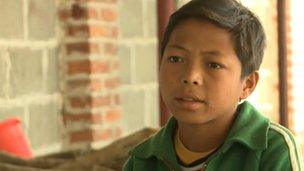
Twelve-year-old Myitung Brang Shawng found his mother shot and dumped in a cesspit
We had to cross into the region from China, illegally and at night, and getting to the camp involved a bone rattling, three-hour drive along muddy tracks.
The difficulty in accessing what is becoming a major humanitarian crisis suits the Burmese government, hundreds of miles away in the new capital city, Nay Pyi Taw.
President Thein Sein is trying to persuade the outside world that Burma's nominally civilian government is very different from those who made up the notoriously brutal military junta of the past.
On Sunday, National League for Democracy leader Aung San Suu Kyi was one of a number of opposition candidates who won parliamentary seats in by-elections which are being seen as a key test of the government's commitment to reform.
And although the authorities postponed voting in three Kachin constituencies, blaming lack of security, President Thein Sein is hoping that the elections will be deemed "free and fair" enough for sanctions against Burma to be lifted.
'Killed with spear'
The stories we heard from the refugees in Kachin tell a very different story.
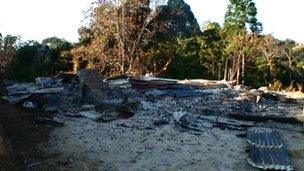
Since the ceasefire ended Kachin has been left littered with burned out villages
Lahpai Zau Bawk cried as he told us the story of how he lost his wife. The Burmese army attacked their village and they all ran, he explained, but his wife, Suu Lam, had just given birth and she could not keep up, getting separated from the group as they hid in the jungle.
"The next day I went back to look for her and found that they'd killed her with a spear, entering through her ribcage on the left and all the way through to her arm on the right," he said. "I found the baby, barely alive, lying next to her mother. I grabbed her and ran."
Twelve-year-old Myitung Brang Shawng spoke in the slow, deliberate manner which I have grown accustomed to hearing from victims of trauma, as if he could still hardly believe his words:
"Everyone was running but my mother didn't and they shot her. I went back and found her body - they'd thrown it in a deep hole that had been dug as a cesspit. It took 10 of us to get the body out and I then buried her," he said.
Truce collapse
The atrocities the refugees described, and many more, all took place during the last nine months, well after Burma's new leaders began their charm offensive on the international community.
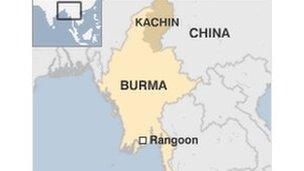
A 17-year truce between the Burmese army and KIA collapsed last year after the KIA refused to become state border guards.
Then fighting broke out near the Chinese border in June 2011 after Burmese army soldiers attempted to move KIA fighters away from the site of a Chinese hydroelectric power plant.
The Kachins have repeatedly condemned the building of the plant, saying it will cause environmental damage and social disruption, including the relocation of some communities.
A March report by campaign group Human Rights Watch (HRW) accused the Burmese army of committing "serious abuses" against the Kachin during the months of fighting - pillaging and burning homes, torturing civilians during interrogations and raping women in villages.
HRW also said the KIA had been involved in abuses, including using child soldiers and anti-personnel mines.
Rice rationed
In December, President Thein Sein ordered a halt to army attacks, telling Burmese forces to shoot only in self-defence against KIA forces. However, the KIA says the troops on the ground are not adhering to this command.
KIA General Sumlat Gun Maw said the order was being ignored for two reasons: "The first is that under the new constitution the president doesn't have that much power over the army and, secondly, President Thein Sein doesn't have the support of the army generals because he wants to reform the country and they don't."
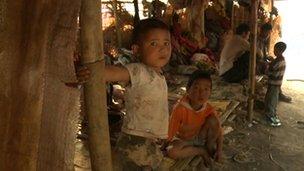
Tens of thousands of people have been forced to take shelter in makeshift refugee camps
Burma's military chiefs have for a long time enjoyed the wealth of these border areas, which are rich in timber, gold and jade.
If they are at odds with the president, this could slow down both democratic reform and a resolution to Burma's long running ethnic conflict.
The Kachin say the fighting was particularly ferocious in December and January, around the time US Secretary of State Hillary Clinton and British Foreign Secretary William Hague were in Nay Pyi Taw congratulating the new Burmese cabinet for progress made so far.
During his December visit, Mr Hague pledged £2m ($3.2m) in aid to the refugees crammed in to the camps of Kachin. That aid is said to be on its way but no-one I met had seen it.
The largest camp in the area, outside the town of Laiza on the Chinese border, holds 5,000 people. When we arrived, they were distributing the day's ration - one cup of rice per child and two for an adult.
I followed 35-year-old Labang Roi San as she carried her bag of rice back to the hut she now calls home. She is six months pregnant and weary of camp life and the constant complaints of hunger from her four young children:
"I am not getting the nutrition a pregnant woman needs," she said as she threw the rice into boiling water. "We long to return to our villages but how can we? The Burmese hate the Kachin people and their army will only attack us again."
Fighting back
From the next door hut came the sound of singing. The Kachin are Christian, converted by British missionaries in the 19th Century, and Labang explained that the group of families were singing hymns and praying for a return home.
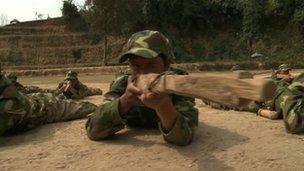
KIA recruits are forced to train using wooden replica guns
I caught the eye of one woman holding a hymn book in one hand and a baby in the other. "What else can we do?" she asked.
Others have chosen a different path.
We met Shang Hting Tang on the KIA parade ground outside Laiza, where he and other new recruits are being trained.
"The Burmese army soldiers came in to our village firing their guns, shooting at the old people who couldn't run," Shang said. "They raped five women, stole our livestock and then set fire to our houses. I'm old, I'm 42, but this is why I joined up."
Plea for help
Shang is by no means the oldest of the recruits - 18-year-olds march alongside 50-year-olds and women, singing stirring Kachin military songs as they march with lyrics such as "we have the spirit to defeat the enemy", which is just as well as they have precious little else.
Training has been cut from three months to two and is carried out using wooden replicas of guns.
Only when they get to the front are AK 47s, World War II rifles and homemade explosives distributed among the new recruits.
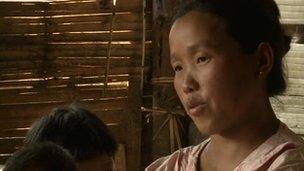
Labang Roi San, who is six months pregnant, says she is not get sufficient nutrients
Barely trained and understandably nervous, they are expected to compete with the better equipped and more experienced Burmese army.
The KIA still use the ranks and the art of warfare they learned from British soldiers whom they fought alongside against the Japanese during World War II.
Invited to stay the night in one of the frontline camps, the soldiers sat around a campfire and, accompanied by their commander on a guitar, sang Beatles songs interspersed with morale raising Kachin ballads.
It was in this setting that Major Pawm Mung Ra admitted to bitterness towards the Kachin's former military allies:
"The British shouldn't forget us in our time of need. We fought for them when they needed us to fight the Japanese. We are now suffering horribly. Surely, this is the time when they should help us?"
Watch Sue Lloyd-Roberts' full report from Kachin on Newsnight on Tuesday 3 April 2012, then afterwards on the BBCiPlayer or Newsnight website.